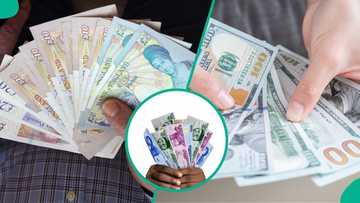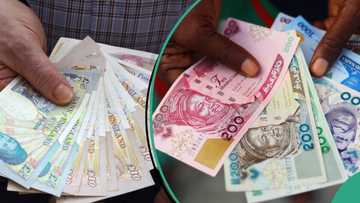Dollar Crashes as Experts Warn Naira May Be Overvalued by 30%, Predict ₦6trn Competitiveness Loss
- Experts at investment bank, Renaissance Capital (Rencap) have warned that the naira may be overvalued by 30%
- The company disclosed that this overvaluation could lead to a N6 trillion loss in competitiveness and higher import bills next year
- The Nigerian currency has surged against the dollar, trading at N1,455 and N1,469 per dollar on Thursday and Friday, respectively
Pascal Oparada, a reporter for Legit.ng, has over ten years of experience covering technology, energy, stocks, investment, and the economy.
The naira has hit its strongest level in nearly 10 months, lifted by tighter monetary policy and rising foreign reserves.
However, a new report by investment bank Renaissance Capital (Rencap) has warned that the currency may now be overvalued by as much as 30%, posing a significant risk to Nigeria’s economic competitiveness.

Source: Getty Images
Nigeria’s import bills may jump
According to Rencap’s findings, this overvaluation could cost Nigeria up to ₦6 trillion in lost competitiveness and higher import bills by 2026, a situation analysts say could hurt local manufacturing and exports.
The report, based on a Real Effective Exchange Rate (REER) model, measures the naira’s strength against a basket of global currencies adjusted for inflation.
It arrives as the exchange rate stabilises between ₦1,400 and ₦1,450 per dollar, supported by strong foreign reserves now above $41 billion.
Artificial strength driven by tight monetary policy
Rencap attributed the naira’s stability to the Central Bank of Nigeria’s (CBN) tight monetary stance, particularly its 27% benchmark interest rate, which has limited liquidity and encouraged investor confidence in naira assets.
However, the bank described this stability as artificial, saying it stems more from restrictive policy than real market strength.
“The underlying data used to justify such high rates may not reflect current inflation trends,” the report said.
While the National Bureau of Statistics (NBS) reported inflation above 20% in August 2025, Rencap estimates actual inflation could fall faster, to 12% in October, 10% by December, and 6% by 2026.

Read also
Naira strengthens to ₦1,476 per dollar as investors dump dollar assets, CBN reforms boost confidence
Based on those projections, Nigeria’s real interest rate would remain around 17%, among the world’s highest.
Data credibility and inflation concerns
Still, the firm warned that sustained investor confidence will depend on accurate inflation reporting, transparent policy decisions, and a gradual realignment of the naira to reflect true economic fundamentals.
It pointed out unusual weightings such as non-alcoholic beverages at 12%, compared with 11% for transport and only 3% for telecommunications, which it said may distort inflation measurement.
“These anomalies could be driving policy decisions that are excessively tight,” Rencap warned, adding that unreliable data risks misguiding fiscal and monetary policy.
Trade risks and possible currency correction
Rencap cautioned that the combination of a strong naira, tight monetary policy, and slowing credit growth has created what it calls a “misalignment risk.”
It warned that when interest rates eventually decline, import demand will likely surge, exposing the naira’s overvaluation and triggering a potential 30% depreciation between 2026 and 2027.
At current import levels of about ₦20 trillion annually, this misalignment translates to roughly ₦6 trillion in extra costs for local producers, effectively an implicit subsidy for imports that undermines domestic industries.
Political and market outlook
With President Bola Tinubu expected to seek re-election in 2027, analysts believe the CBN may resist aggressive policy changes until after the polls to maintain short-term currency stability.
Despite the risks, Rencap noted that foreign investors are gradually returning to Nigerian and Ghanaian debt markets, betting on falling global interest rates and a weaker U.S. dollar in 2026.

Source: Getty Images
Still, the firm warned that sustained investor confidence will depend on accurate inflation reporting, transparent policy decisions, and a gradual realignment of the naira to reflect true economic fundamentals.
What stronger currency mean for Nigerians
Legit.ng earlier reported that for years, Nigerians have endured headlines about a falling naira and dwindling reserves.
But the story is changing. In recent weeks, the local currency has shown signs of resilience, trading at ₦1,488 per dollar, while Nigeria’s external reserves jumped by over $600 million.
The twin gains have sparked cautious optimism among analysts, businesses, and everyday Nigerians.
Source: Legit.ng



